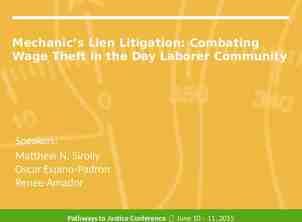TEACHING BOOLEAN USING FASTCASE
22 Slides1.59 MB

TEACHING BOOLEAN USING FASTCASE

BOOLEAN SEARCHING Uses specific, pre-defined operators to specify which search terms are important and how they should be related. Examples: Fire and apprentice Fraud not criminal Rule* /5 “803(5)” AND knowledge OR recall NOT memory Benefits: High-level precision Downsides: Requires consideration as to what terms are important Requires review of search terms to ensure correct operators are used for the desired relationship of terms.

A BIT OF HISTORY Formal logics were initially developed in ancient times in Ancient Egypt, China, & India. George Boole (1815-1864): first recorded modern proponent of using logical statements to express mathematical terms. Boolean logic is now the basis of modern binary, as well as the most precise system of searching documents (also known as Keyword searching)

TWO THINGS TO KEEP IN MIND Synonymy Ambiguity Words that can mean the same thing Use synonyms for better results Ex. Car, vehicle, truck, van, automobile Words that can mean more than one thing Avoid ambiguity by adding terms or the “not” operator Ex: Negligence not criminal

FASTCASE BOOLEAN OPERATORS Operat or Example Description AND, & libel AND damages Results must contain both “libel” and “damages” OR premarital OR prenuptial Results must contain either “premarital” or “prenuptial” NOT negligence NOT criminal Results must contain “negligence” but not the word “criminal” w/3, /3 custody /15 interrogation Results must contain “custody” within 15 words of “interrogation.” *, ! testif* Results must contain some variation of the stem “testif” such as testified, testify, testifying, etc. ? mari?uana Results must contain m-a-r-i- -u-a-n-a with any letter substituted for the question mark “” “estate tax” Results must contain the exact phrase

BOOLEAN SEARCH OPERATORS

AND — DOG AND BITE Dog Do g& bite Bite Only returns cases at the intersection — ones containing both the words “dog” and “bite.”

OR — CAR OR VEHICLE car OR vehicle Car .Vehicle Car & Vehicl e Returns all cases around the perimeter of the two words — either those using the word “car” or the word “vehicle.”

NOT — SPEECH NOT SCHOOL speech NOT school Speec h Schoo l Only returns cases mentioning “speech” without referencing the word “school.”

SPEECH NOT (SCHOOL OR POLITICAL) speech NOT (school OR political) school OR political Speec h Politic al Scho ol Only returns cases mentioning “speech,” but not mentioning “school” or “political.”

SPEECH AND PUBLIC NOT (SCHOOL OR POLITICAL) (speech AND public) NOT (school OR political) The cases returned will use both the words “speech” and “public” but won’t use Speech Political “X ” Public School school OR political

PROXIMITY OR WITHIN — W/# OR /# custody w/5 interrogation — returns cases where custody appears within 5 words of interrogation Sample matches: in-custody interrogation of a suspect . . . . matches.) (w/1 unless in-custody police interrogation is . . . . (w/2 matches.) interrogation while in custody may give . . . . (w/3 matches.) custody for purposes of interrogation . . . . matches.) (w/4

“QUOTATION MARKS” Sample matches: “communicati . . . that the communications privilege ons privilege” encompassed within the same statute — returns only precludes . . . . . . marital communications privilege is not cases with applicable here because Mr. and Mrs. Irons that exact were estranged at the time of the conversations. phrase Not in search results: . . . spouse may enjoy marital privileges from . . . . . the marital communications privilege may be waived . . .

GENERAL NOTE ON THE PLURAL FORM Remember to include your Plurals Full text search engines do not automatically look for plurals in Boolean searches If you want to include plurals, you have to tell the engine to look for them by using a wildcard or root expander

ROOT EXPANDER (*, !) — MAR* Return cases with at least one word that begins with “mar.” Pros: Useful for plurals, different tenses, gerunds, etc. Cons: Can slow down search times – if you just want to search plurals, OR is faster Can be over-inclusive — see, e.g., maritime in this search.

THE SINGLE CHARACTER (?)- M? N OPERATOR Use the “?” operator in circumstances where you are uncertain as to how the court spelled a particular term. For example, did the court spell: Marijuana or Marihuana? Use mari?uana Catch both spellings

ORDER OF OPERATIONS W/5 AND NOT OR The “Within” operator runs first The “And” operator is run second The “Exclude” operator runs third The “Or” operator runs last

PARENTHESES — WHAT HAPPENS WHEN THE USER DOES NOT USE IT What the user entered: car OR vehicle AND getaway What the Search Engine actually saw: car OR vehicle AND getaway

SUBTLE BUT IMPORTANT DISTINCTION How do we fix it? Use parenthesis to tell the search engine what step to do first (nesting): (car OR vehicle) AND getaway

ADVANCED ORDER OF OPERATIONS Consider the following searches: A: Rule* /5 “803(5)” AND knowledge OR recall NOT memory B: knowledge OR recall NOT memory AND Rule* /5 “803(5)” C: Rule* /5 “803(5)” AND (knowledge OR recall) NOT memory (wrong): 157,342 results; B (wrong): 1,038,488 results; C (right): 99 results

Concept Testimonial privilege Communications privilege Compelled testimony Keyword and operator Spouse Criminal trial (testimon* or marital) /3 privileg* AND (compel* or requir*) /5 testif* AND (spous* or husband or wife) NOT civil

(TESTIMON* OR MARITAL) /3 PRIVILEG* AND (COMPEL* OR REQUIR*) /5 TESTI* AND (SPOUS* OR HUSBAND OR WIFE) AND NOT CIVIL






